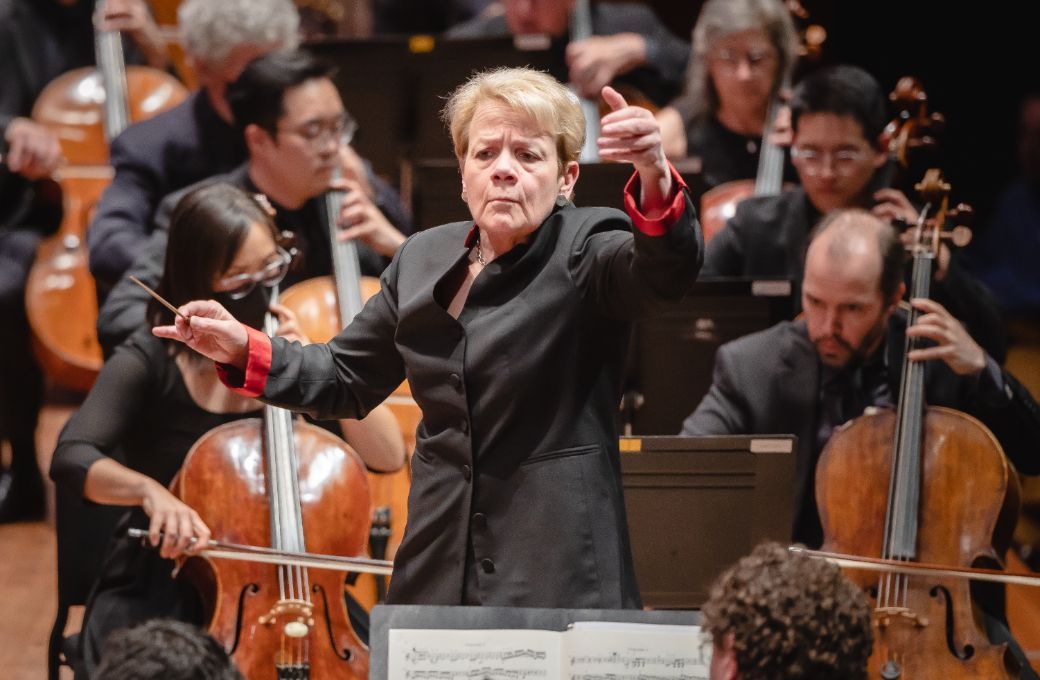There was nothing star-crossed about Marin Alsop’s guest appearance with the Seattle Symphony. Fortune turned its wheel to allow for a happy, if long-overdue, collaboration following an absence of almost two decades from Benaroya Hall. In the interim, Alsop made history as the first woman to lead a major American orchestra when she took over as the Baltimore Symphony’s Music Director. Having stepped down from that post in 2021, she remains highly sought after and was just named Chief Conductor of the Polish National Radio Symphony Orchestra (starting in the fall).

The originally scheduled programme did, however, need to be altered: unforeseen changes in artist availability deprived us of the rarely performed Songfest by Leonard Bernstein, which had already been postponed since 2020. In its place, Alsop led a concert of pieces inspired by Romeo and Juliet that attracted one of the biggest crowds I’ve seen all season — and left them unmistakably enraptured. Well-trodden repertoire, to be sure, but played with an engaging sense of fresh involvement. Throughout the concert, the SSO responded with enthusiasm and even wonder to Alsop’s charismatic podium presence.
Alsop coaxed a decidedly ominous tone from the lower woodwinds in the moody introduction to Tchaikovsky’s fantasy overture (with Luke Fieweger leading on bassoon). The piece’s lyrical effusions in particular glowed with a melancholy warmth, benefiting from Alsop’s exquisitely calibrated control of dynamics and of how sounds are layered— one of her most immediately notable strengths. The agitated music of the clashing Capulets and Montagues, on the other hand, could have been more incisive. It came across as slightly labored, never quite reaching the desired level of thrilling incandescence.
But the playing heated up considerably with Bernstein’s musical take on Romeo and Juliet, the highlight of the evening. The SSO kicked into high gear for an account of the Symphonic Dances from West Side Story in which nothing was taken for granted. Alsop stirred the musicians into an ecstatic frenzy in the gang music that reminded me more than once of her recent, high-energy Rite of Spring a couple months ago at Carnegie Hall with the Philadelphia Orchestra.
At the same time, articulation was maintained with a meticulous clarity, so that small details registered in unexpected ways, making it clear that Alsop has a personal connection to this music. Her feeling for the balletic impulse behind West Side Story – how much of the story is rendered through physical, kinetic gesture as well as emotion – was especially rewarding.
The dancer’s perspective continued into the evening’s second half, devoted to a selection of numbers from across the three suites Prokofiev arranged from his Romeo and Juliet ballet score. The opening march music of Montagues and Capulets advanced with a gait as dire as Poe’s fatefully swinging pendulum – though relief was offered by Jeffrey Barker’s gently desolate flute solo in the middle section’s variant.
Alsop played up the contrasts Prokofiev encompasses, not just contrasts of material and pacing but of instrumentation. She relished the quirky touches of his orchestration, to the point that Romeo and Juliet at times resembled a fractal concerto for orchestra, sections opening up into Easter eggs for subsections.
The juxtaposition of these treatments brought home the fact that the violence depicted in Shakespeare’s tragedy has been at least as important as the love story in inspiring memorable music. It was similarly intriguing to compare the varied senses of an ending, with Bernstein hearkening back to a Romantic hint of transcendence, like Tchaikovsky – though both composers hedge this with ambivalent gestures. By the end of the concert, the audience seemed reluctant to let Alsop go, eventually parting in sweet sorrow.


